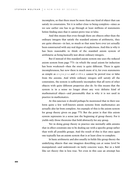incomplete, so that there must be more than one kind of object that can satisfy its constraints. Yet it is rather close to being complete—since as we saw earlier one has to go through at least millions of statements before finding ones that it cannot prove true or false.
And this means that even though there are objects other than the ordinary integers that satisfy the standard axioms of arithmetic, they are quite obscure—in fact, so much so that none have ever yet actually been constructed with any real degree of explicitness. And this is why it has been reasonable to think of the standard axiom system of arithmetic as being basically just about ordinary integers.
But if instead of this standard axiom system one uses the reduced axiom system from page 773—in which the usual axiom for induction has been weakened—then the story is quite different. There is again incompleteness, but now there is much more of it, for even statements as simple as x+yy+x and x+0x cannot be proved true or false from the axioms. And while ordinary integers still satisfy all the constraints, the system is sufficiently incomplete that all sorts of other objects with quite different properties also do. So this means that the system is in a sense no longer about any very definite kind of mathematical object—and presumably that is why it is not used in practice in mathematics.
At this juncture it should perhaps be mentioned that in their raw form quite a few well-known axiom systems from mathematics are actually also far from complete. An example of this is the axiom system for group theory given on page 773. But the point is that this axiom system represents in a sense just the beginning of group theory. For it yields only those theorems that hold abstractly for any group.
Yet in doing group theory in practice one normally adds axioms that in effect constrain one to be dealing say with a specific group rather than with all possible groups. And the result of this is that once again one typically has an axiom system that is at least close to complete.
In basic arithmetic and also usually in fields like group theory the underlying objects that one imagines describing can at some level be manipulated—and understood—in fairly concrete ways. But in a field like set theory this is less true. Yet even in this case an attempt has




